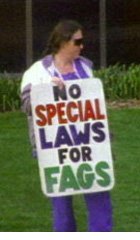
Shades of Gray 2001
Distributed by Seventh Art Releasing, 7551 Sunset Blvd., Suite 104, Los Angeles, CA 90046; 323-845-1455
Produced by Edward P. Stencel
Directed by Tim Depaege
VHS, color, 39 min.
Adult
Human Rights, Multicultural Studies, Gender Studies, Sociology, Urban Studies, Gay & Lesbian Studies
Date Entered: 11/09/2018
Reviewed by LaRoi Lawton, Library & Learning Resources Department, Bronx Community College of the City University of New YorkThe struggle of LGBT (lesbian, gay, bisexual and transgender) people for full equality is one of this generation’s most important and galvanizing civil rights movements. Despite the many advances that have been made, however, LGBT people continue to face discrimination in many areas of life. No federal law prevents a person from being fired or refused a job on the basis of sexual orientation. The nation’s largest employer – the U.S. military – openly discriminates against gays and lesbians. Mothers and fathers still lose child custody simply because they are gay or lesbian. And gay people are still denied the right to marry in all states.
Shades of Gray offers a much-needed perspective on the largely ignored and misunderstood population of gay men and women living in the Midwest. Their stories are interwoven with the political struggle of the city of Lawrence, to add the words "sexual orientation" to the local Human Rights ordinance. The film was shown as part of the Gladys Crane Mountain Plains Film Festival in Laramie, Wyo. Laramie, of course has become infamous because of the murder of a gay University of Wyoming student Matthew Shepard near that city. There is a connection between the Shepard case and the 1995 civil rights struggle in Kansas, and the main connection is a Kansas minister named Fred Phelps. Phelps, known for his pithy slogans like "God hates fags" is a central figure in the film. He and his followers are shown picketing Shepard's funeral. In an interview, Phelps reveals that he was a high-profile civil rights lawyer in Kansas, helping to secure liberties for blacks. Explaining his seemingly contradictory opposition to civil rights for gays, he said that the Bible does not condemn blacks but it does condemn gays. He comments on what he calls the pro-gay bias in the media and in Hollywood. Utterly unfazed by media criticism, he says, "I wish we could have a Matt Shepard funeral every week." The picketing of Shepard's funeral happened years after the Lawrence, Kansas gay rights issue was settled. Discrimination based on sexual orientation still permeates many areas of American life. Businesses openly fire LGBT employees, and every year, lesbians and gay men are denied jobs and access to housing, hotels and other public accommodations. Many more are forced to hide their lives, deny their families and lie about their loved ones just to get by.
Another minister, who refused to be interviewed, is also opposed to the Lawrence ordinance which would add sexual orientation to the list of protected civil rights categories such as race, ethnicity, religion, etc. The Rev. Leo Barbie, an African-American uses a less direct approach in his opposition to the ordinance. He claims that gays are not being discriminated against. He also produces scientific evidence against gays which his opponents say was falsified by a discredited researcher. The film uses footage from the city council hearings, and interviews. This film comes highly recommended by this reviewer because it illustrates in clear black and white the essence of a civil rights struggle at the grassroots level. People make changes and it is their collective and individual struggles on both sides of this “controversial fence” that the viewer sees up close and personal. Embedded in morality, human and civil rights issues, Shades of Gray brings the issue of gay and lesbian rights out of the gray area into the light.